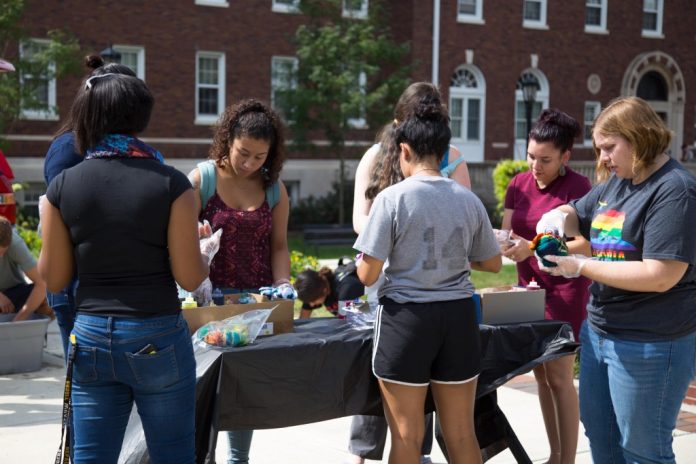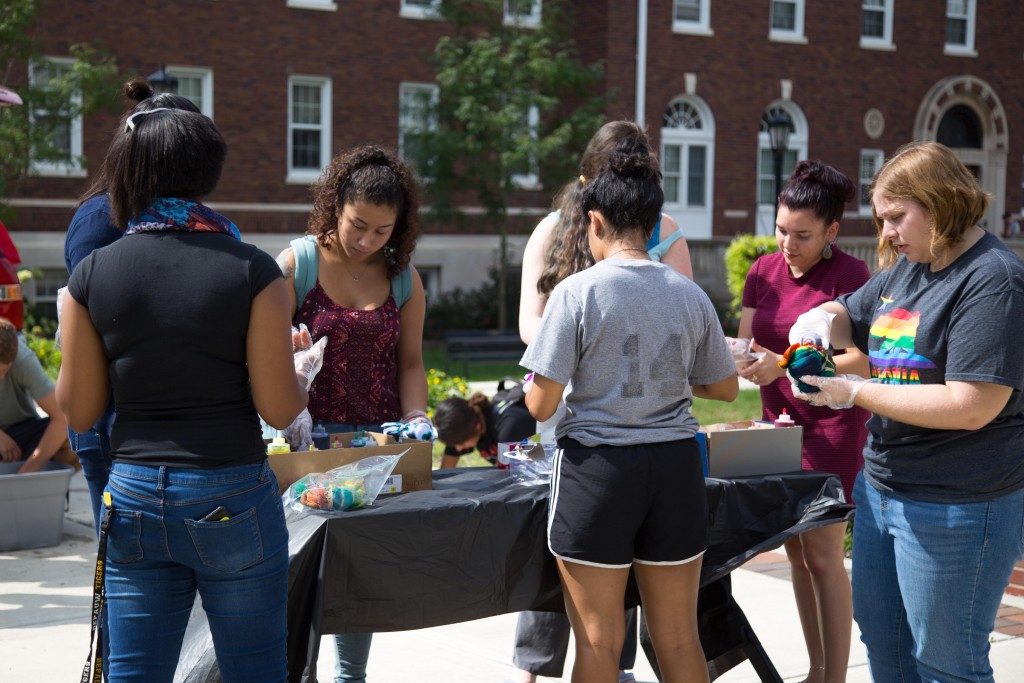

GERALD PINEDA/ THE DEPAUW
Indiana University and Boston University, along with over 200 other universities across the United States have some sort of special housing for LGBTQ+ students according to campuspride.org; DePauw University has has now been added to that list.
For the first time, first-years were given the opportunity to opt-in to live on Rainbow Floor, a community created to provide students in, or allied with, the LGBTQ+ community a safe space.
The creation of the floor was initiated by Assistant Director for Campus Living & Community Development (CLCD), Amanda Halfacre, along with Vivie Nguyen who was the coordinator for LGBTQ+ services last school year. Halfacre said she really wanted to be able to provide something similar to what she heard other universities do for LGBTQ+ students, along with conversations she had with students who felt they couldn’t find a community on DePauw’s campus.
There are 12 residents living on Rainbow Floor and their Resident Assistant (RA), sophomore Diana Dolquist, liked the idea behind the floor. “It’s just a very promising concept, it’s the beginning of DePauw being more progressive and that’s awesome,” Dolquist said. Doloquist said living with a roommate can be difficult and “...when you're not comfortable because of your gender identity or your sexual identity it’s even worse because you just feel like you can’t be who you are.”
Resident of Rainbow Floor, Madeleine Feller, said that living on this floor has provided her with a sense of family, and a safe place where people in general can just be themselves. “There’s transgender people who get killed for walking into the wrong bathrooms and LGBTQ+ people who are accosted and harassed, and having a place where you can just go to sleep and not worry about waking up with your room spraypainted is a huge deal,” said Feller.
Halfacre is especially proud that Rainbow Floor is built to be community based, but doesn’t require the residents to do any extra work. “For a lot of other schools it will be a learning community so the residents are required to take a course or do additional work. This is not extra work [for students], it’s just providing a space,” said Halfacre.
As of this year, DePauw also has a new house for LGBTQ+ students called Rainbow House, located on 709 Locust Street, for LGBTQ+ students and student allies. Rainbow House is a community-based house initiated by juniors Jackson Bailey and Saige Huiet, who have been working on creating a LGBTQ+ house since their first year at DePauw in 2014. As opposed to the Rainbow Floor, which is a floor in a residence hall just for freshmen, Rainbow House is a house for upperclassmen.
Bailey, who had an unpleasant first-year experience living in a residence hall, wishes he would have had the opportunity to live on Rainbow Floor. “I felt pretty uncomfortable, especially when you go to the bathroom and you go to the shower, and you just never know what’s going to happen in there,” Bailey said. In fact, Bailey said that students from Rainbow Floor have already gone to hang out at Rainbow House and he believes that having a bond between Rainbow Floor and Rainbow House is important.
Social media chair of United DePauw, an LGBTQ+ advocacy and activism organization on campus, junior Laurel Tilton, thinks Rainbow House and Rainbow Floor are proof the LGBTQ+ community’s presence has grown. When she was a first-year, she said she didn’t even know there was an LGBTQ+ organization until halfway through the first semester.
Tilton, however, also said people have expressed to her that intentional communities are a form of segregation. She argued that considering events, such as what happened in Orlando, it’s not so much segregation, but just having a place to feel safe. “I get how people can feel excluded, but at the same time when most of this university exists as a heterosexual space and a cis-sexual space, you need these spaces to just come back to at the end of the day,” Tilton said.
Similar to Tilton, Halfacre hopes that Rainbow Floor along with Rainbow House and United DePauw will add the opportunity to build a community. “When you’re a member of a marginalized group it’s important to find community, and in rural Indiana that may be a little hard to find, but this is a safe space for them,” said Halfacre. She also hopes that Rainbow Floor shows DePauw’s commitment to students who identify as LGBTQ+ and to create safe spaces.
Halfacre asked for the location of the Rainbow Floor not to be published for the privacy and safety of its residents.
